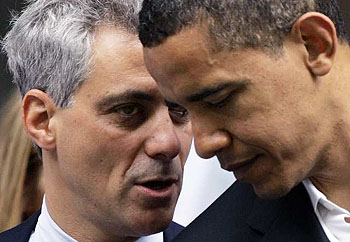 Another Rahm Emanuel profile? How many of these things do we need? But Noam Scheiber’s piece in the New Republic does contain this interesting backstory tidbit:
Another Rahm Emanuel profile? How many of these things do we need? But Noam Scheiber’s piece in the New Republic does contain this interesting backstory tidbit:
From the very beginning, Emanuel had a clean, elegant theory for how to guide a health care bill through Congress. He’d closely studied each previous failure from Harry Truman to Bill Clinton and concluded that time was their biggest enemy. Because remaking the health care system is such a complex task, it necessarily requires complex legislation. And there hasn’t been a 1,000-page–plus bill in history that didn’t start to stink after several months. It’s just too easy for opponents to cull a few smelly details.
So Emanuel placed a premium on speed. He nagged constantly, setting numerous deadlines….The corollary to this theory was that speed required momentum. If the hundreds of players in Congress and the health care industry believed reform would pass, then they would act so as to make that likely.
….For the first half of last year, this was almost all you needed to know about the administration’s strategy. Then, in July, the White House faced a key decision. Max Baucus, the chairman of the Senate Finance Committee, probably the most important of the five committees considering health care, had spent months negotiating with his Republican counterpart, Chuck Grassley, with little to show for it. Emanuel was getting antsy. He gathered his top aides and pressed for a way to hurry the process along. The Senate labor committee had produced its own health care bill. Perhaps, Emanuel wondered, Majority Leader Harry Reid could bypass Baucus and bring it to the floor. Or maybe Baucus could just stop bargaining with Grassley and let Reid move a more partisan version of his bill.
But, in the end, Obama himself favored letting Baucus negotiate until September….In fairness, even internal skeptics believed a bipartisan package might be attainable. The problem was that, overlaid on a strategy based on speed and momentum, the extra two months exacted a major cost.
Matt Yglesias says he’s happy that Obama mostly pays attention to his policy shop, not his political shop. “The pacing of health care, however, was really just an argument about politics and would have been a smart time to listen to your savvy DC political hand.”
True. But I’d tentatively take another conclusion away from this. One of the questions that’s been in the front of my mind ever since the 2008 campaign is: Is Obama serious? Does he really believe in all that bipartisan booshwa? If Scheiber is right, this anecdote suggests that he really, really does. It’s not just a political ploy, and it’s not just a way of gaining public support. He really did think that if he negotiated long enough and treated Republicans with enough respect, a few of them would climb on board.
Now, Scheiber also reports that “even internal skeptics” favored the bipartisan approach. But I don’t know if this makes things better or worse. Was the White House really packed full of people so pollyannish that they believed Chuck Grassley and John Kyl and a handful of other Republicans might eventually jump on board a policy that the Republican Party had feverishly opposed for decades? Further, that they might do so in a political environment that was growing more toxic with every passing day, fueled by the likes of Glenn Beck, Sarah Palin, and the tea partiers? Seriously? What were they smoking over there?
From 3,000 miles away, I know this stuff can seem a lot simpler than it really is. But this really flabbergasts me. It just seems wildly divorced from political reality. What did they see that I didn’t?

















